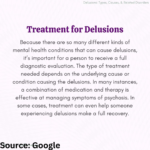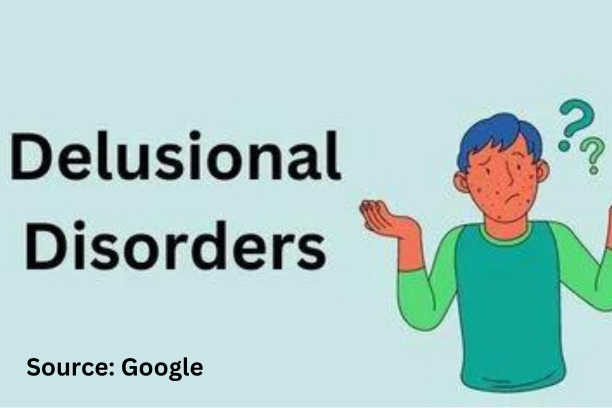Delusional Disorder is a psychiatric condition characterized by persistent false beliefs, despite evidence to the contrary. These delusions often involve misinterpretations of experiences or situations, leading to significant distress and impaired daily functioning. One kind of psychotic disorder is delusional disorder. The existence of one or more delusions is its primary symptom. An unwavering belief in something false is called a delusion. The person has this incorrect notion, which practically everyone else understands to be untrue, and it is not a part of their society or subculture.
Types of Delusions
Persecutory Delusions
One common subtype of Delusional Disorder is persecutory delusions. Individuals with this type believe they are being targeted, harassed, or conspired against without any factual basis. Persecutory delusions are the belief that someone or something is out to get them. Despite the absence of evidence, they are adamant that this is true. Paranoia is one of the forms of persecution fantasies.
Grandiose Delusions
Grandiose delusions involve an exaggerated sense of self-importance or unique abilities. People experiencing grandiose delusions may believe they possess exceptional talents, wealth, or even a special connection with renowned figures. Delusions of grandeur refer to false or erroneous convictions that one possesses unique abilities, riches, a purpose, or a distinct identity.
Erotomanic Delusions
Erotomanic delusions revolve around the false belief that someone, often of higher social status, is in love with the individual. Despite no evidence supporting this claim, individuals with this delusion remain convinced of the romantic connection. One unusual type of paranoid delusion is egotmania. The affected person has a strong belief that they are the object of someone else’s love. This misconception grows and endures in spite of abundantly evident evidence to the contrary. Erotomania is a rare disorder that primarily affects women.
Somatic Delusions
Somatic delusions focus on misconceptions about the body. These can include beliefs about having a severe illness or physical defect, even when medical examinations show no such abnormalities.
An incorrect perception that one’s internal or exterior body functions are abnormal is known as a somatic delusion. This perception may also include thinking that someone’s physical appearance is incredibly erratic.
A relatively rare kind of delusion, monosymptomatic hypochondriacal psychosis is another name for this illness. People with somatic delusions are difficult to persuade that their symptoms or thoughts are anything but true.
Diagnosis and Criteria
To diagnose Delusional Disorder, mental health professionals follow specific criteria outlined in the Diagnostic and Statistical Manual of Mental Disorders (DSM-5). The key components include the presence of delusions lasting one month or longer, no concurrent major mood episodes, and no apparent psychotic disorder.
Causes and Risk Factors
Understanding the causes and risk factors associated with Delusional Disorder is crucial for effective management.
Biological Factors
Genetic predisposition and abnormalities in brain structure or function are potential biological contributors. However, the exact mechanisms remain the subject of ongoing research.
Environmental Factors
Traumatic experiences, chronic stress, or substance abuse may contribute to the development of Delusional Disorder. These environmental factors can interact with genetic vulnerabilities, increasing the risk of manifestation.
Treatment Options
Psychotherapy
Psychotherapy, particularly cognitive-behavioral therapy (CBT), is a primary intervention for Delusional Disorder. CBT helps individuals challenge and modify distorted thought patterns, promoting more rational thinking.
Medications
Antipsychotic medications, such as risperidone or olanzapine, are often prescribed to alleviate symptoms associated with Delusional Disorder. These medications aim to regulate neurotransmitter imbalances in the brain.
Hospitalization
In severe cases where individuals pose a risk to themselves or others, hospitalization may be necessary. This provides a structured environment for intensive treatment and monitoring.
Living with Delusional Disorder
Coping with Delusional Disorder involves a combination of treatment, support from loved ones, and lifestyle adjustments.
Support Systems
Building a robust support system is essential for individuals with Delusional Disorder. Friends and family can play a crucial role in providing emotional support and assisting with treatment adherence.
Stress Management
Given the potential impact of stress on the disorder, effective stress management strategies, such as mindfulness and relaxation techniques. These can significantly improve the overall well-being of individuals with Delusional Disorder.
Medication Adherence
Consistent adherence to prescribed medications is vital for managing symptoms. Regular follow-up appointments with mental health professionals ensure ongoing evaluation and adjustment of treatment plans.
FAQs
What is an example of a delusional disorder?
Delusion examples include persecutory delusions, where an individual believes they are targeted, and grandiose delusions, involving an exaggerated sense of self-importance or unique abilities.
What is the main cause of delusions?
The main causes of delusions are complex and multifaceted. Biological factors, such as genetic predisposition and brain abnormalities, interact with environmental factors like trauma, stress, and substance abuse.
What is the treatment for delusional disorder?

Treatment for Delusional Disorder often involves psychotherapy, such as cognitive-behavioral therapy (CBT), and medication like antipsychotics (e.g., risperidone). Hospitalization may be necessary in severe cases, providing a structured environment for intensive care.
What is the most common delusional thought disorder?
Persecutory delusions are among the most common delusional thought disorders. Individuals experiencing persecutory delusions falsely believe they are being harassed, targeted, or conspired against without any factual basis.
What is the difference between psychosis and delusional disorder?
Psychosis is a broader term encompassing severe mental disorders where individuals lose touch with reality. Delusional Disorder is a specific subtype of psychosis characterized by persistent, false beliefs (delusions) without significant mood disturbances.
What is the difference between psychosis and delusions?
Psychosis refers to a state where an individual loses touch with reality, experiencing delusions, hallucinations, or impaired thinking. Delusions, on the other hand, specifically involve persistent false beliefs, a key symptom of Delusional Disorder within the psychosis spectrum.
Conclusion
In conclusion, Delusional Disorder is a complex psychiatric condition that requires a comprehensive approach to diagnosis and treatment. By understanding the various types of delusions, diagnostic criteria, potential causes, and available treatment options, individuals affected by Delusional Disorder can navigate towards a path of improved mental health and well-being. Remember, seeking professional help is the first step towards a brighter future.
